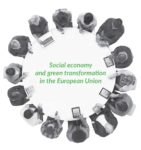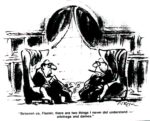Nancy MacLean’s book, Democracy in Chains, raised questions about James M. Buchanan’s commitment to democracy. This paper investigates the relationship of classical liberalism in general and of Buchanan in particular to democratic theory. Contrary to the simplistic classical liberal juxtaposition of “coercion vs. consent,” there have been from Antiquity onwards voluntary contractarian defenses of non-democratic […]
Classical Liberalism and Workplace Democracy
This is a paper coauthored by Tej Gonza for the European Liberal Forum, the foundation associated with the Lib-Dem parties of the EU in the EU Parliament. It explores the support for workplace democracy given by democratic classical liberals such as Tocqueville, Mill, Dewey, and Buchanan.
Fallacies of Corporate Analysis
Our goal is to analyze a miscellany of fallacies concerning the Citizens United case, corporate personhood, the stakeholder theory, the affected interests principle, and finally ending with the deeper fallacies concerning the rights of capital that are embedded in the conventional economic theories of capital and corporate finance.
The Case for Workplace Democracy
“In Chapter 11, David Ellerman offers a theoretical justification for a form of workplace democracy. He argues that a philosophical defence of workers’ control of workplaces and the products of their labour is possible outside of the lineage of Marxist and communist theory.” [Editor’s introduction] Amen
Extending All Boolean Operations to Partitions
The lattice operations of join and meet were defined for set partitions in the nineteenth century, but no new logical operations on partitions were defined and studied during the twentieth century. Yet there is a simple and natural graph-theoretic method presented here to define any n-ary Boolean operation on partitions. An equivalent closure-theoretic method is […]
Lavoie Referee Report on “Property & Contract”
Edit This is Don Lavoie’s letter giving his referee report on my Property & Contract book which was published by Basil Blackwell in 1992. Don Lavoie (1951-2001) was a neo-Austrian economics professor at George Mason University. He developed a hermeneutical approach to economics. Click here to download the letter.
Finding the Markets in the Math
This paper shows how to find competitive market prices in the pure mathematics of classical constrained optimization problems.
New Light on the Objective Indefiniteness or Literal Interpretation of QM
This paper shows how the mathematics of QM is the math of indefiniteness and thus, literally and realistically interpreted, it describes an objectively indefinite reality at the quantum level. In particular, the mathematics of wave propagation is shown to also be the math of the evolution of indefinite states that does not change the degree of indistinctness between states. This corrects the historical wrong turn of seeing QM as “wave mechanics” rather than the mechanics of particles with indefinite/definite properties.
Interview at Norwegian Thinktank Manifest (English trans.)
English translation of June 2018 interview at Oslo think-tank Manifest.
LAHS Class of ’61 Yearbook
Thanks to Butch Ray’s page on Gray Haired Teenagers, here is a PDF of the essential pages (none of the ads) for the 1961 year book concerning the Senior Class that year.





